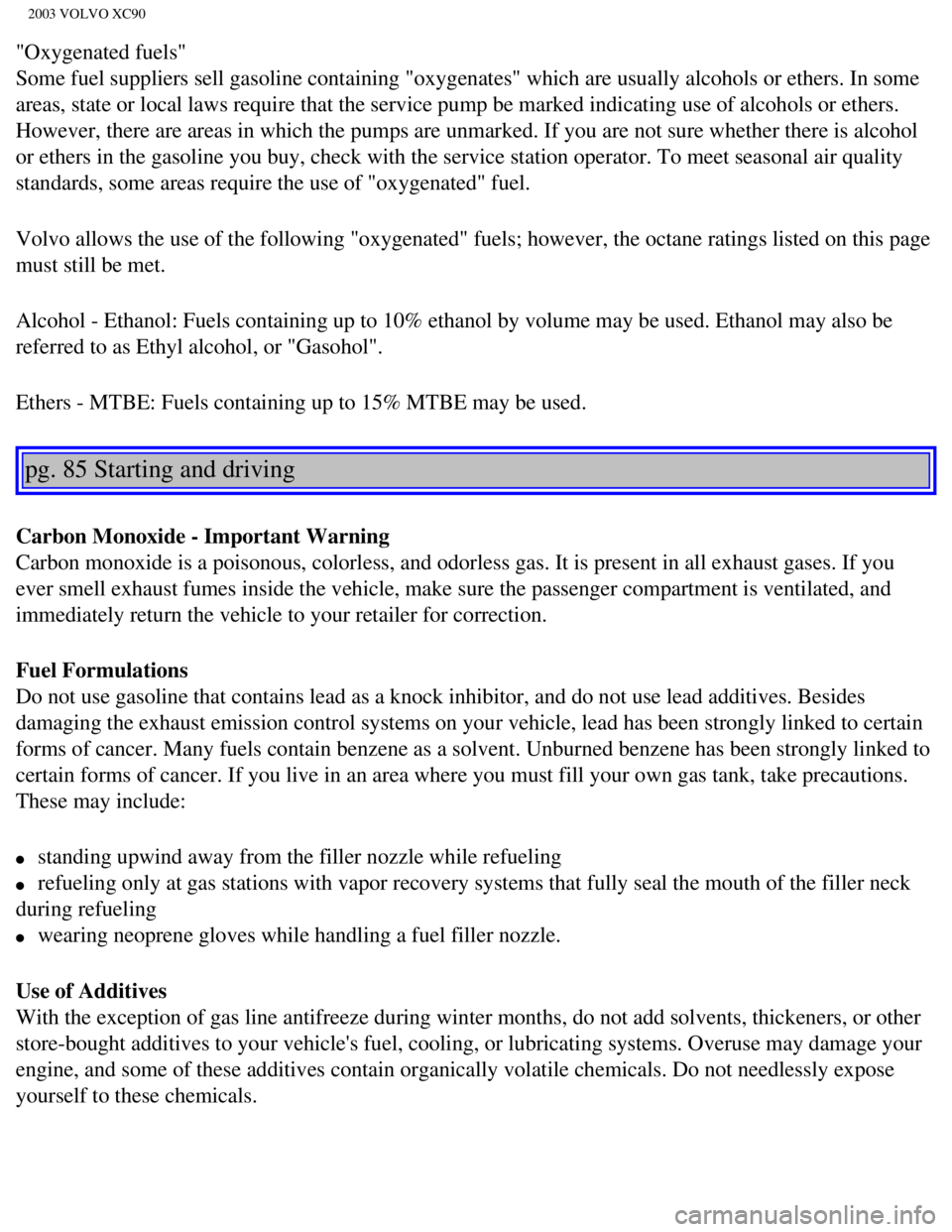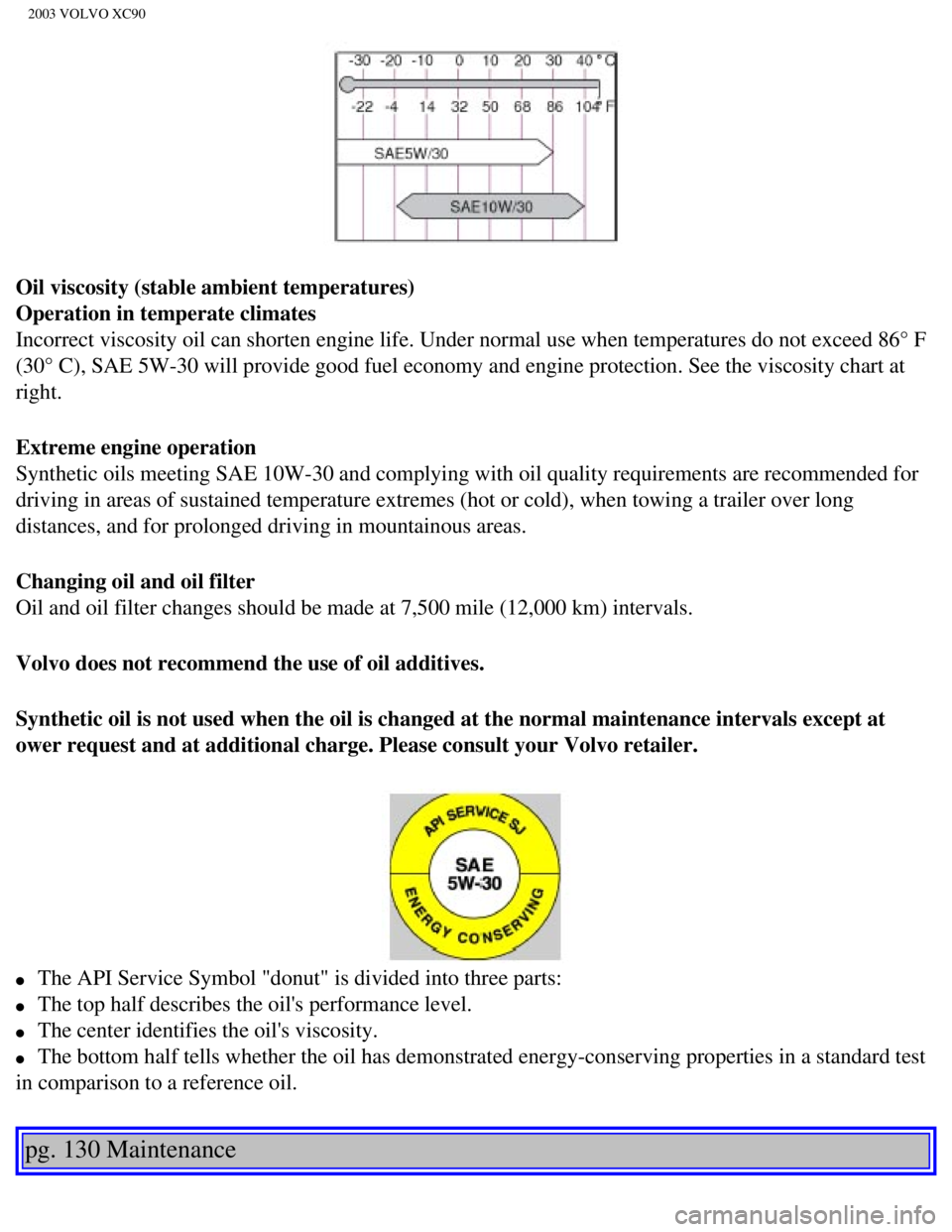2003 VOLVO XC90 fuel additives
[x] Cancel search: fuel additivesPage 105 of 242

2003 VOLVO XC90
pg. 84 Starting and driving
ENGINE OIL
Although some oil consumption occurs during normal engine operation, mor\
e oil is consumed when the
engine is new as the internal parts generate higher friction while weari\
ng-in to each other. From the time
the engine is new until the first maintenance is performed, the oil cons\
umption could be higher than
normal. For this reason, it is especially important to check the oil eve\
ry time you refuel your vehicle
during this period. See
page 130.
Fuel requirements
Octane rating
Volvo engines are designed for optimum performance on unleaded premium g\
asoline with an AKI
octane rating of 91 or above. AKI (ANTI KNOCK INDEX) is an average of \
the Research Octane
Number, RON, and the Motor Octane Number, MON. ((RON + MON)/2). The \
minimum octane
requirement is AKI 87 (RON 91).
Deposit control gasoline (detergent additives)
Volvo recommends the use of detergent gasoline to control engine deposit\
s. Detergent gasoline is
effective in keeping injectors and intake valves clean. Consistent use o\
f deposit control gasolines will
help ensure good driveability and fuel economy. If you are not sure whet\
her the gasoline contains
deposit control additives, check with the service station operator.
NOTE: Volvo does not recommend the use of external fuel injector cleaning syst\
ems.
Unleaded fuel
Each Volvo has a three-way catalytic converter and must use only unleade\
d gasoline. U.S. and Canadian
regulations require that pumps delivering unleaded gasoline be labelled \
"UNLEADED". Only these
pumps have nozzles which fit your vehicle's filler inlet. It is unlawful\
to dispense leaded fuel into a
vehicle labelled "unleaded gasoline only". Leaded gasoline damages the t\
hree-way catalytic converter
and the heated oxygen sensor system. Repeated use of leaded gasoline wil\
l lessen the effectiveness of
the emission control system and could result in loss of emission warrant\
y coverage. State and local
vehicle inspection programs will make detection of misfueling easier, po\
ssibly resulting in emission test
failure for misfueled vehicles.
NOTE: Some U.S. and Canadian gasolines contain an octane enhancing additive ca\
lled methyl-
cyclopentadienyl manganese tricarbonyl (MMT). If such fuels are used, \
your Emission Control System
performance may be affected, and the Check Engine Light (malfunction in\
dicator lamp) located on your
instrument panel may light. If this occurs, please return your vehicle t\
o an authorized Volvo retailer for
maintenance.
Gasoline containing alcohol and ethers
file:///K|/ownersdocs/2003/2003_XC90/03xc90_06a.htm (2 of 15)12/30/200\
6 4:18:58 PM
Page 106 of 242

2003 VOLVO XC90
"Oxygenated fuels"
Some fuel suppliers sell gasoline containing "oxygenates" which are usua\
lly alcohols or ethers. In some
areas, state or local laws require that the service pump be marked indic\
ating use of alcohols or ethers.
However, there are areas in which the pumps are unmarked. If you are not\
sure whether there is alcohol
or ethers in the gasoline you buy, check with the service station operat\
or. To meet seasonal air quality
standards, some areas require the use of "oxygenated" fuel.
Volvo allows the use of the following "oxygenated" fuels; however, the o\
ctane ratings listed on this page
must still be met.
Alcohol - Ethanol: Fuels containing up to 10% ethanol by volume may be u\
sed. Ethanol may also be
referred to as Ethyl alcohol, or "Gasohol".
Ethers - MTBE: Fuels containing up to 15% MTBE may be used.
pg. 85 Starting and driving
Carbon Monoxide - Important Warning
Carbon monoxide is a poisonous, colorless, and odorless gas. It is prese\
nt in all exhaust gases. If you
ever smell exhaust fumes inside the vehicle, make sure the passenger com\
partment is ventilated, and
immediately return the vehicle to your retailer for correction.
Fuel Formulations
Do not use gasoline that contains lead as a knock inhibitor, and do not \
use lead additives. Besides
damaging the exhaust emission control systems on your vehicle, lead has \
been strongly linked to certain
forms of cancer. Many fuels contain benzene as a solvent. Unburned benze\
ne has been strongly linked to
certain forms of cancer. If you live in an area where you must fill your\
own gas tank, take precautions.
These may include:
l standing upwind away from the filler nozzle while refueling
l refueling only at gas stations with vapor recovery systems that fully se\
al the mouth of the filler neck
during refueling
l wearing neoprene gloves while handling a fuel filler nozzle.
Use of Additives
With the exception of gas line antifreeze during winter months, do not a\
dd solvents, thickeners, or other
store-bought additives to your vehicle's fuel, cooling, or lubricating s\
ystems. Overuse may damage your
engine, and some of these additives contain organically volatile chemica\
ls. Do not needlessly expose
yourself to these chemicals.
file:///K|/ownersdocs/2003/2003_XC90/03xc90_06a.htm (3 of 15)12/30/200\
6 4:18:58 PM
Page 159 of 242

2003 VOLVO XC90
6. Dipstick - engine oil
7. Filler cap - engine oil
8. Washer fluid reservoir
9. Power steering fluid reservoir
10. Expansion tank - coolant
11. Data plate
12. Battery (under floor in rear cargo area)
WARNING!
The cooling fan (4) may start or continue to operate (for up to 6 min\
utes) after the engine has been
switched off.
pg. 129 Maintenance
Oil and fluids
Oil quality
Engine oil must meet the minimum ILSAC specification GF-2, including ACE\
A A1, API SJ, SJ/CF and
SJ/Energy Conserving.
Your Volvo has been certified to standards using ILSAC oil specification\
GF-2 5W-30. Volvo
recommends use of oil with a quality rating equal to or higher than ILSA\
C GF-2. Equivalent and better
oils include ACEA A1, API SJ, SJ/CF, and SJ/Energy conserving. Lower qua\
lity oils may not offer the
same fuel economy, engine performance, or engine protection.
Volvo Cars recommends Castrol.
Depending on your driving habits, premium or synthetic oils may provide \
superior fuel economy and
engine protection. Consult your Volvo retailer for recommendations on pr\
emium or synthetic oils.
Oil additives must not be used.
NOTE: Synthetic oil is not used when the oil is changed at the normal maintena\
nce is carried out. This
oil is only used at customer request, at additional charge. Please consu\
lt your Volvo retailer.
Operation in hot climates.
When temperatures exceed 86° F (30° C) in your area, Volvo recom\
mends, for the protection of your
engine, that you use a heavier weight oil, such as SAE 10W-30. See the v\
iscosity chart below.
file:///K|/ownersdocs/2003/2003_XC90/03xc90_09a.htm (7 of 15)12/30/200\
6 4:19:02 PM
Page 160 of 242

2003 VOLVO XC90
Oil viscosity (stable ambient temperatures)
Operation in temperate climates
Incorrect viscosity oil can shorten engine life. Under normal use when t\
emperatures do not exceed 86° F
(30° C), SAE 5W-30 will provide good fuel economy and engine protec\
tion. See the viscosity chart at
right.
Extreme engine operation
Synthetic oils meeting SAE 10W-30 and complying with oil quality require\
ments are recommended for
driving in areas of sustained temperature extremes (hot or cold), when\
towing a trailer over long
distances, and for prolonged driving in mountainous areas.
Changing oil and oil filter
Oil and oil filter changes should be made at 7,500 mile (12,000 km) in\
tervals.
Volvo does not recommend the use of oil additives.
Synthetic oil is not used when the oil is changed at the normal maintena\
nce intervals except at
ower request and at additional charge. Please consult your Volvo retaile\
r.
l The API Service Symbol "donut" is divided into three parts:
l The top half describes the oil's performance level.
l The center identifies the oil's viscosity.
l The bottom half tells whether the oil has demonstrated energy-conserving\
properties in a standard test
in comparison to a reference oil.
pg. 130 Maintenance
file:///K|/ownersdocs/2003/2003_XC90/03xc90_09a.htm (8 of 15)12/30/200\
6 4:19:02 PM
Page 195 of 242

2003 VOLVO XC90
2) Vehicles with all wheel drive (AWD), see also page 103
WARNING!
When adding accessories, equipment, luggage and other cargo to your vehi\
cle, the total capacity
weight must not be exceeded.
Capacities
Fuel tank 19 US gals. (72 liters), minimum octane requirement - AKI 87 (RON
91) - unleaded fuel (See also page 84)
Engine oil
B5254T2 6.1 US qts. (5.8 liters)
B6294T 7.1 US qts. (6.7 liters)
Transmission oil
Automatic (AW 55-50 5- speed) 7.9 US qts. (7.5 liters)
Automatic (GM 4-speed) 13.4 US qts (12.7 liters)
Miscellaneous
Power steering 0.9 US qts. (0.9 liters)
Windshield washer reservoir 6.9 US qts. (6.5 liters)
Brake fluid 0.63 US qts. (0.6 liters)
Air conditioning system Front - 2.2 lb. (1 kg), Rear (option) 2.9 lb. (1.3 kg) R 134a
pg. 153 Specifications
Lubricants
Engine oil
Meeting minimum ILSAC specification GF-2, including ACEA A1, API SJ, SJ/\
CF and SJ/ Energy
Conserving.
Oil additives must not be used.
Transmission
Oil grade:
4-speed automatic (on models with 6-cylinder turbo engines):
Dexron III G (Volvo P/N 1161521).
file:///K|/ownersdocs/2003/2003_XC90/03xc90_10.htm (5 of 10)12/30/2006\
4:19:05 PM